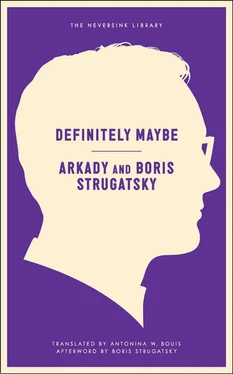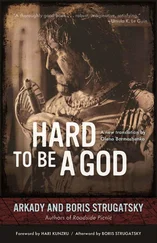The case that delayed the writing of the book was that of Mikhail Kheifets, who was arrested for “spreading anti-Soviet propaganda” in 1974. Kheifets was charged with writing the introduction to a collection of poems by Joseph Brodsky and editing a collection of essays by Andrei Amalrik, both of which were samizdat editions. Samizdat , which literally means “self-published,” was the method by which banned works were circulated in the Soviet Union: people typed manuscripts with as many carbon copies as possible and passed them around, and the recipients retyped more copies. Boris was called as a witness, and denied ever having seen the books. Kheifets was given four years in the labor camps.
After the death of his brother in 1991, Boris wrote under the pen name S. Vititsky, and Search for Predestination, or the Twenty-Seventh Theorem of Ethics (1995) deals with the KGB and the Kheifets case. Boris died in 2012.
Antonina W. Bouis
AN AFTERWORD TO DEFINITELY MAYBE
On April 23, 1973, this notation appeared in our work diary:
Ark[ady] arrived to write a proposal for Aurora [publishing house].
1. “Faust, 20th century.” Hell and Heaven try to stop the development of science.
2. A Billion Years Before the End of the World (“before the Final Judgment”).
Saboteurs
The Devil
Aliens
Spiridon Octopi
Union of the Nine
The Universe
This was followed by a proposal that gave the essence and plot of the future novella in much detail and with great similarity to the final version. The rare case where we managed to build the “skeleton” of a novella in a single workday.
The further elaboration of the book was continued during a May meeting—we even began writing a rough draft and a dozen pages—but then we had to interrupt the work: first to work on the screenplay for Fighting Cats and then on the novella The Kid from Hell . It was only in June 1974, having rewritten the ten pages, that we took up Billion seriously and completed it in December.
Today I am certain that the delay of almost a year was only beneficial. In the spring of 1974, BN was dragged into the so-called Kheifets affair: this was his first face-to-face confrontation with our valiant “competent organs”; fortunately, he was only called as a witness. This confrontation (described in a fair amount of detail by S. Vititsky in Search for Predestination ) left an ineradicable mark on BN and colored (at least for him) the entire atmosphere of Billion in a completely specific way and with a completely specific tone. Billion became for BN (and naturally, according to the law of communicating vessels, for AN as well) a novella about the tormenting and essentially hopeless struggle of mankind to preserve the “right of primogeniture” against the dull, blind, persistent force that knows neither honor, nor nobility, nor charity, that knows only one thing—how to achieve its goals, by any means, without any setbacks. When we wrote this novella, we could clearly see the real and cruel proto-image of the Homeostatic Universe that we had invented, and we saw ourselves in the subtext, and we tried to be realistic and ruthless—toward ourselves and the entire invented situation from which there was only one exit, as in the real world—through the loss, total or partial, of self-respect. “If you have the guts to be yourself,” as John Updike wrote, “other people’ll pay your price.”
Amazingly, even though the subtext of the novella seemed carefully hidden, it kept poking through uncontrollably and making the authorities wary. Thus, Aurora, which was waiting impatiently for our novella, and which had in fact commissioned it and even given us an advance, despite the good reviews, despite the absolute impossibility of picking on any specific thing as unacceptable, despite their original goodwill toward the authors—despite all this, they immediately demanded that the action be moved to some capitalist country (“the USA, for example”), and when the authors refused, they immediately rejected the novella, with regret but decisively.
We managed to get it published in the magazine Znaniesila , and at the cost of relatively small changes. The first victim of the censors was naturally Lidochka’s bra, which was declared a toxic bomb placed by the authors under the people’s morality…. But most of all, I remember, we were surprised by the determined and totally uncompromising insistence that the warning telegram (“BOBCHIK SILENT VIOLATING HOMEOPATHIC UNIVERSE”) be removed. It remains an editorial secret as to which higher-up had what “uncontrolled associations” with that telegram. They had at first demanded that we cut the Homeostatic Universe en grand , but we and our editor friends managed to fight them off with a relatively minor concession: getting rid of the concept of “homeostasis” (which for some reason the authorities imbued with a socio-mystical significance) and introducing the concept of “Preservation of the Structure” (apparently, this was devoid of all social-mystical spirit). We also had to change “criminal investigator” to “procuratorial investigator.” Or the other way around. I don’t remember. One of these investigators did not suit the overseers—which one? Why? God only knows. Or perhaps the devil; it’s more in his line, I think.
I just had a thought: all the characters have a prototype. A rare case! No one is totally made up, except for Investigator Zykov, and even he is an average of Porfiry Petrovich (see Crime and Punishment ) and the KGB investigator who was in charge of the Kheifets case. Perhaps that’s why we always considered Billion one of our favorite novellas—it was a piece of our life, a very concrete, very personal life, filled with absolutely concrete people and real events. And as we all know, there is nothing more pleasurable than recalling unpleasantness that has bypassed us successfully.
Boris Strugatsky
ABOUT THE AUTHORS

ARKADY(1925–1991) and BORIS(1933–2012) STRUGATSKYwere the most acclaimed and beloved science fiction writers of the Soviet era. The brothers were born and raised in Leningrad, the sons of a critic and a teacher. When the city was besieged by the Germans during World War II, Arkady and their father, Natan, were evacuated to the countryside. Boris remained in Leningrad with their mother throughout the war. Arkady was drafted into the Soviet army and studied at the Military Institute of Foreign Languages, graduating in 1949 as an interpreter from English and Japanese. He served as an interpreter in the Far East before returning to Moscow in 1955. Boris studied astronomy at Leningrad State University, and worked as an astronomer and computer engineer. In the mid-1950s, the brothers began to write fiction, and soon published their first jointly written novel, From Beyond . They would go on to write twenty-five novels together, including Roadside Picnic , which was the basis for Andrei Tarkovsky’s film Stalker ; Snail on the Slope ; Hard to Be a God ; and Monday Begins on Saturday , as well as numerous short stories, essays, plays, and film scripts. Their books have been translated into multiple languages and published in twenty-seven countries. After Arkady’s death in 1991, Boris continued writing, publishing two books under the name S. Vititsky. Boris died on November 19, 2012, at the age of seventy-nine. The asteroid 3054 Strugatskia, discovered in 1977, the year Definitely Maybe was first published, is named after the brothers.
Читать дальше













